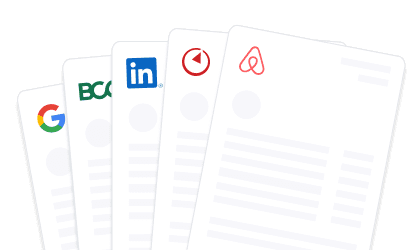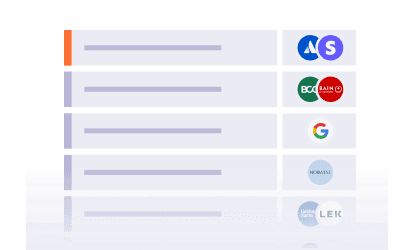10 Job-Ready Career Skills That Will Set You Apart
Discover the essential job-ready skills that will give you a competitive edge in today's job market.
Posted October 26, 2025

Join a free event
Learn from top coaches and industry experts in live, interactive sessions you can join for free.
Table of Contents
Building a successful career requires more than just education and experience. Employers look for a combination of job-ready career skills that show a candidate is prepared for the work environment. Whether someone is just starting or looking to grow in a specific role, these skills determine how well they perform in their job.
This guide covers 10 key career skills, including soft skills, technical skills, and workplace readiness skills. Employers value these abilities because they help individuals contribute effectively, adapt to challenges, and work well with teams. Understanding and developing these skills before you begin work can make a significant difference in your career success.
The Importance of Job-Ready Career Skills
To succeed in your career, having a job-ready career skill set is non-negotiable. Lessons fall into five key categories that are crucial for becoming a highly valued employee. Employers expect more than just a basic understanding of the job. They want workplace readiness skills that enable you to contribute to the team right from day one. These skills don’t just improve your employability; they set you up for long-term career success.
A successful career is built on a foundation of both technical skills and soft skills. While you may be an expert in your specific role, developing personal skills—like communication and problem-solving—ensures you’re prepared for any situation that arises in your career. Career readiness is about combining all these career skills so you can perform effectively and confidently in the workplace.
The 10 Job-Ready Career Skills that Employers Look for in Candidates
| Job-Ready Career Skill | Description |
|---|---|
| Communication Skills | This includes active listening and verbal and written communication to express ideas clearly. |
| Problem-solving and Critical Thinking | The ability to analyze issues, think logically, and provide practical solutions. |
| Adaptability and Learning New Skills | Willingness to develop new abilities and adjust to different job requirements. |
| Teamwork and Collaboration | Working effectively with others and managing relationships in the workplace. |
| Leadership and Initiative | Taking responsibility, making decisions, and motivating others. |
| Time Management and Organization | Prioritizing tasks, meeting deadlines, and maintaining productivity. |
| Professionalism and Work Ethics | Being reliable, responsible, and committed to quality work. |
| Technical Skills for Workplace Success | Understanding industry-specific skills and using technology effectively. |
| Customer Service and Relationship Building | Addressing client needs and maintaining positive professional relationships. |
| Career Readiness and Long-Term Growth | Engaging in career development activities, mentorship, and continuous learning. |
1. Communication Skills
Active Listening and Clear Expression
Strong communication is necessary in any workplace. It includes speaking, writing, and listening. Many job tasks depend on clear communication, whether it’s sending emails, participating in meetings, or explaining ideas. Active listening is one of the most important communication skills. It involves:
- Paying full attention to the speaker.
- Asking relevant questions.
- Repeating key points to confirm understanding.
Written and Verbal Communication
Employers expect professionals to express their ideas clearly. Miscommunication can cause mistakes, delays, and misunderstandings. Examples of workplace communication include:
| Type of Communication | For example in the Workplace |
|---|---|
| Verbal | Speaking in meetings, phone calls, video calls |
| Non-verbal | Body language, eye contact, facial expressions |
| Written | Emails, reports, presentations |
2. Problem-solving and Critical Thinking
Understanding Complex Tasks
Every job comes with challenges. Employers want employees who can understand problems and find solutions. Strong problem-solving skills help individuals overcome obstacles and improve processes.
Applying Knowledge to Real-World Scenarios
Critical thinking allows professionals to use knowledge effectively. Instead of reacting quickly, they assess the situation and make logical decisions. Employers value those who can:
- Analyze problems from different angles.
- Think through the consequences of their decisions.
- Offer practical solutions.
3. Adaptability and Learning New Skills
Work Readiness Training
Industries change, and employers expect employees to keep up. Being open to developing new skills is important for long-term career growth. Some ways to build adaptability are:
- Taking on new projects.
- Learning different tasks outside of a specific role.
- Seeking professional development opportunities.
Gaining Knowledge Beyond a Specific Role
Employees who continue to develop their skills become more valuable. Learning new technologies, improving existing skills, and attending training programs are ways to stay competitive in the job market.
4. Teamwork and Collaboration
Building Strong Relationships
Most jobs require working with others. Whether it’s a small team or a large department, employees must cooperate to meet goals. Employers look for individuals who:
- Communicate well with colleagues.
- Share ideas and listen to others.
- Help coworkers when needed.
Conflict Resolution in the Workplace
Disagreements happen in any work environment. Knowing how to handle them professionally is a valuable skill. Key conflict resolution strategies are:
- Stay calm and listen to all sides.
- Identify the cause of the conflict.
- Work together to find a solution.
5. Leadership and Initiative
Taking Responsibility
Leadership isn’t just about managing people. It’s about taking responsibility, making decisions, and motivating others. Employees who take the initiative:
- Solve problems without waiting for instructions.
- Offer suggestions for improvement.
- Help team members succeed.
Developing a Leadership Mindset
Anyone can develop leadership skills by taking on more responsibility and making decisions that benefit the team. Strong leadership qualities set candidates apart in competitive job markets.
6. Time Management and Organization
Prioritizing Tasks Effectively
Managing time well is important in any job. Employers expect employees to meet deadlines and balance multiple responsibilities. Time management tips:
- Set priorities based on importance and urgency.
- Break larger tasks into smaller steps.
- Use calendars and task lists to stay organized.
Avoiding Distractions and Staying Focused
Workplaces have many distractions. Those who manage their time well can complete tasks efficiently without getting sidetracked.
7. Professionalism and Work Ethic
Being a Highly Valued Employee
Employers value employees who are reliable, dedicated, and professional. A strong work ethic includes:
- Arriving on time and being prepared.
- Completing work with attention to detail.
- Taking responsibility for mistakes and learning from them.
Workplace Readiness Skills That Make a Difference
Employers notice employees who show responsibility, respect, and commitment. Small habits—like responding to emails promptly and following through on commitments—build a professional reputation.
8. Technical Skills for Workplace Success
Industry-Specific Skills for a Specific Role
Different careers require different technical skills. Employers expect job candidates to have the necessary skills for their specific role. Some examples of industry-specific skills:
| Industry | Technical Skills Needed |
|---|---|
| IT | Coding, software development, cybersecurity |
| Finance | Data analysis, accounting software, budgeting |
| Healthcare | Medical procedures, patient care, documentation |
Using Technology Effectively
Basic technical skills, like using email, spreadsheets, and project management tools, are required in most workplaces. Employees who improve their technical skills become more competitive in the job market.
9. Customer Service and Relationship Building
Understanding Customer and Client Needs
Many jobs involve working with customers, whether in direct sales, support, or client services. Strong customer service skills show that an employee can:
- Listen to customers and understand their concerns.
- Provide helpful and clear responses.
- Handle difficult situations professionally.
Developing Strong Interpersonal Skills
Good relationships with coworkers and clients lead to a better work experience. Employees who are polite, patient, and responsive build positive professional relationships.
10. Career Readiness and Long-Term Growth
Building a Strong Career Path
Long-term career development requires planning and learning. Some ways to grow in a career include:
- Seeking mentorship from experienced professionals.
- Continuing education through workshops and certifications.
- Taking on challenging projects.
Lessons from Career Solutions Publishing and Other Career Programs
Organizations like Career Solutions Publishing offer structured learning programs that help students and professionals improve their job-ready career skills. Training programs focus on:
- Developing key workplace readiness skills.
- Learning real-world applications of employability skills.
- Gaining hands-on experience before starting a new job.
Final Thoughts
Employers seek candidates who have both soft skills and technical skills. Building strong job-ready career skills makes individuals more prepared for their jobs and helps them grow in their careers. Those who continuously develop their skills, take on challenges, and learn from experiences are more likely to succeed in any work environment. By focusing on these 10 key skills, professionals can stand out in competitive job markets and advance in their careers.
Get Expert Career Coaching
A career development coach can help you improve your job-ready career skills, prepare for new opportunities, and stand out to potential employers. Get personalized guidance on career readiness, workplace skills, and professional growth.
Related Articles
For more insights on developing strong job-ready career skills and improving your career readiness, check out these related articles:
- How to Cultivate a Growth Mindset for Career Success
- 10 Career Development Questions to Ask Your Boss
- How to Build Your Career Outside of the US
- Top 10 Management and Executive Coaches
- Top Productivity Coaches
- How to Define Success on Your Terms
- The Role of Mentors: How Guiding Relationships Can Shape Your Career
- Top 10 Career Mentors
- Top 10 Soft Skills Coaches
FAQs
What are job-ready career skills?
- Job-ready career skills are the abilities that prepare individuals for success in the workplace. These include technical skills specific to a job as well as soft skills such as communication, problem-solving, and teamwork. Employers look for candidates who can demonstrate these abilities in real-world work environments.
Why are soft skills important for a successful career?
- Soft skills play a critical role in workplace success because they impact how professionals interact with colleagues, clients, and management. Skills such as active listening, adaptability, and conflict resolution help employees communicate effectively, collaborate on tasks, and maintain a positive work environment. Employers value these skills because they contribute to teamwork, efficiency, and overall job performance.
How can I develop technical skills relevant to my career?
- Technical skills can be developed through education, training, and hands-on experience. Many professionals gain technical skills by earning degrees or certifications, enrolling in online courses, or attending industry-related workshops. On-the-job training also plays an important role in skill development, as employees can learn directly from real-world work situations. Staying updated with industry trends and continuously improving job-specific knowledge can increase career opportunities.
What is the role of adaptability in career development?
- Adaptability is a key skill in career development because workplaces are constantly changing. Employees who can adjust to new challenges, learn different job functions, and stay open to acquiring new skills tend to grow faster in their careers. Employers value individuals who show flexibility, take on different responsibilities when needed, and remain solution-oriented in changing work environments.
How can I improve my employability skills to attract potential employers?
- Improving employability skills requires a combination of education, practical experience, and professional development. Communication skills are essential for building strong relationships in the workplace, while professionalism and reliability help establish a good reputation among employers. Learning industry-specific skills, gaining hands-on experience, and continuing education through training programs or mentorship can make a job candidate more competitive. Developing a strong work ethic, being punctual, and taking initiative in projects also demonstrate readiness for long-term career success.
Browse hundreds of expert coaches
Leland coaches have helped thousands of people achieve their goals. A dedicated mentor can make all the difference.



























